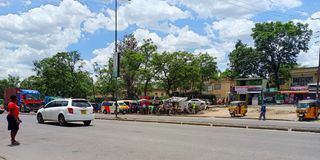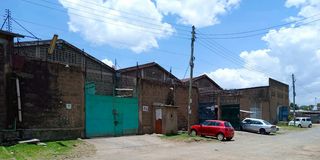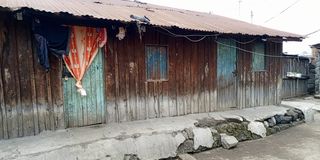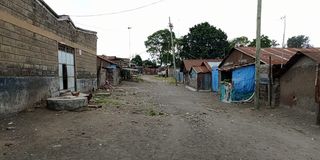My Hood: An estate that remains unchanged, despite having 24-hour economy

Kolen stage which forms part of Gilani estate makes the estate run a 24-hour economy.
It is an estate named after one of Nakuru’s prominent families, the Gilani family, that has shaped Nakuru for the last 40 years.
I am informed that Gilani estate earned its name from go downs that were set up by the Gilani family within the area.

The Go down facility owned by Gilani family influenced the name of Gilani estate.
As you walk around the estate, you quickly notice that there are a lot of young people in the area.
My guide Kevin Ongera, who has lived in Gilani for the last 16 years, says many of the people born here rarely move out to other estates.

Kevin Ongera has lived in Gilani estate for 16 years.
Interestingly, Kevin informs me that the poor and the rich peacefully co-exist in this estate, therefore making it hard to classify it as a place for a people of one social class.
“You will see high-end apartments, but in their midst, there are very many informal settlements which truly showcase the gap between the rich and the poor.”

Some of the houses in Gilani estate.
He also shares another interesting perspective, saying that with the financial gap between the rich and poor, those who are not well off really feel the pinch economically.
“Many of the vendors in the area know that there are those who are well off and therefore they exaggerate prices of certain commodities. But the rest of us cannot afford these items so we opt to go to the market and buy the products at cheaper prices.”
On the other end, Kevin says the Gilani area runs on a 24-hour economy owing to the fact that the famous Kolen stage is located in the area. With the large number of cars in transit both during the day and night, the area is always busy.
“Cars that travel through this route to the western part of the country often stop here to get refreshments or add passengers as they continue with their journey.”
As you move into the inner parts of Gilani, there are a notable number of bars and liquor stores which often operate late into the night, contributing to the buzzing night life.
During our tour of the estate, I noticed that there are so many industries, malls and fuelling stations in the area. It goes without saying that any place well established with industries would grow exponentially but this is not the case.

The inner parts of Gilani estate remain in a deplorable state.
“It is until you get into the interior parts of Gilani estate that you notice the pathetic state the residents are living in. With the industrialization in the area, one would expect some level of corporate social responsibility from these companies, but that does not happen.”
He concludes by saying that in his own assessment of the last 16 years that he has lived in Gilani, there is no notable growth.
